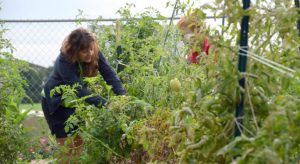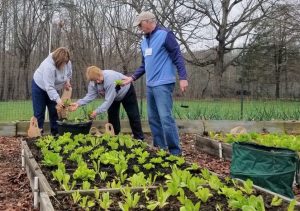During tragedy of pandemic, gardening interests bloom
University of Illinois Extension Services — January 10, 2021

The increase in vegetable gardening is likely is due to concerns of food safety or shopping and an increase in naturally or organically grown foods, according to University of Illinois Extension Horticulture Educator Richard Hentschel. (Photo courtesy of U of Illinois Extension Services)
In a strange and stressful year, many people turned to gardening for respite. Gardening increased 43 percent in 2020, according to a survey conducted by the Minnesota firm Axiom Marketing.
“A whole bunch of us got into, or more into, gardening in 2020,” says University of Illinois Extension Horticulture Educator Richard Hentschel. “And, it looks like that trend may continue into 2021.”
Extension educators and Master Gardeners helped many first-time home gardeners solve problems and source materials. Garden centers saw a boom in sales.
“Younger gardeners really embraced growing in their yards this year,” Hentschel says. Seventy-two percent of gardeners under 40 say that they spent more time gardening in 2020. Renters of condominiums and apartments also grew gardens, with more than half of the respondents growing vegetables and one in three using container gardening.
The increase in vegetable gardening is likely is due to concerns of food safety or shopping and an increase in naturally or organically grown foods, Hentschel says.
In addition to vegetables, 73 percent of survey respondents grew flowers. “If you are going to be spending more time at home and in the yard, you want it to look good,” Hentschel says.
Why did people garden in 2020? Top responses included creating a beautiful outdoor space, personal enjoyment, and something to do. About 82 percent said they were successful in their gardening endeavors. “Some may have been first-time gardeners, or others may have taken on the challenge of a new type of gardening, or a new crop,” Hentschel says.
The gardening push is expected to continue in 2021, with 86 percent indicating they’ll garden the same amount or more next year. The youngest gardeners, those under 40, are most anxious to return, with 94 percent planning to garden again next year.
Looking ahead to 2021, Hentschel says winter is a good time to start planning for the growing season. You can find Extension resources to help at extension.illinois.edu/global/horticulture.
Four Seasons Gardening webinars return

The gardening push is expected to continue in 2021, with 86 percent indicating they’ll garden the same amount or more next year. The therapeutic benefits of gardening have been documented since ancient times. (Photo courtesy of Virginia Tech)
The University of Illinois Extension Four Seasons Gardening series will return in 2021 with three monthly webinars starting in January.
Horticulture educators will lead seasons on winter fruit tree pruning, the therapeutic value of nature and adaptive gardening to accommodate age and mobility.
Fruit Tree Pruning, 1:30 p.m., Jan. 19: Pruning fruit trees in late winter is a necessary task to reap the greatest benefit and yield from trees. Horticulture educator Andrew Holsinger will present a variety of pruning techniques for apples and other fruit trees.
Therapeutic Value of Nature, 1:30 p.m., Feb. 16: Are you stressed from having to practice social distancing? Can’t go anywhere? Do anything? Spending time in Nature can help soothe and heal. Horticulture educator Mary M. Fischer will present research-based studies to support the healing powers of Nature.
Adaptive Gardening, 1:30 p.m., March 9: The therapeutic benefits of gardening have been documented since ancient times but there has been a recent upswing in the interest for therapeutic gardening and horticulture. But how can people of different abilities adapt their garden space to suit their needs? Horticulture educator Chris Enroth discusses best practices for adapting gardens to accommodate age, mobility or other means. Chris will also share how to help yourself and others enjoy the art of gardening at home or in institutions such as schools, assisted living facilities and others.
The webinars are free, but advance registration is required. Sign up online at go.illinois.edu/fourseasons. After registering, participants will receive an email with access information.
If you need reasonable accommodation to participate in this program, contact Martha Smith at smithma@illinois.edu. Early requests are strongly encouraged to allow sufficient time for the requested accommodation.







